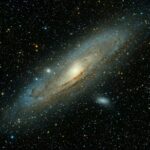We celebrate National Space Day on the first Friday in May, which is May 5 this year. It was created to inspire all of us in the pursuit of knowledge and progress. There’s so much going on in the universe, it definitely deserves a day to reflect on everything! Though it’s unlikely you’ll be able to celebrate in outer space, you can still take part in your own corner of the universe with our gravity-defying facts, figures, and ideas for getting involved this National Space Day.
When is National Space Day 2024?
Never-ending and ever-expanding, space is celebrated on National Space Day, which takes place on the first Friday in May — May 5 this year.
History of National Space Day
We could say that National Space Day’s history starts at the beginning of the universe itself, when an intense pressure and temperature resulted in the Big Bang, exploding the universe and everything in it into existence.Ever since, the curious-minded have been fascinated with space and its state of feeling so near and yet so far. Whilst early cultures identified things in the sky as gods or spirits, it was the ancient Greeks who developed the study of planets and stars into something resembling the astronomy we know today. Although the heliocentric system was first suggested by the ancient Greeks, the theory wasn’t developed and published until 1543 when Copernicus outlined his ideas about the planets revolving around the sun.Astronomy was further advanced by Galileo Galilei in the 17th century, who has often been referred to as ‘the father of astronomy’ due to his avid pursuit of it against the wishes of his patrons, colleagues, and even the Pope. He invented important apparatus for observing space and proving his theories, although he spent much of his life under house arrest for his work.Centuries later, space continued to be a contentious issue when the space race began between Cold War rivals, America and Russia. The two countries competed to be the first to achieve space flight and eventually put a man on the moon. The victory was America’s, when Apollo 11 and its team of astronauts landed on the moon on July 16, 1969.In 1997, the Lockheed Martin Corporation introduced National Space Day as a one-off event, and it was later expanded to International Space Day in 2001, due to its extreme popularity, by former astronaut and senator John Glenn.Suns, stars, moons, and infinite realms. How do we even begin to explain the magnitude of space? What’s truly beautiful about space is that it may be endless, and yet there are millions of billions of secrets that it holds, each important and keeping everything in place. Humans have not even scratched the surface of the secrets that this infinite vacuum we know as space holds. But that doesn’t mean that we can’t celebrate what we do know, and be in awe of it.On the first Friday in May each year, scientists, astronomers, astronauts, science buffs, and more, observe National Space Day, celebrating its mysteries and beyond. There is plenty to discuss and learn about space during this annual observance; from documentaries on television to discussions on online forums, everyone can benefit from learning about space.The history of space is older than life on Earth and dates back to the beginning of the universe, following the Big Bang, which propelled life, time, and existence. The yearly celebration of space on Earth was started by Lockheed Martin in 1997 as a day to promote space and the fields of STEM among the youth.In 2001, former Astronaut Senator John Glenn broadened the scope of National Space Day celebrations, encouraging everyone to participate and learn about space exploration.
National Space Day timeline
The universe explodes into existence after (scientists believe) a period of intense heat and density caused it to expand.
Nicolaus Copernicus proposes the heliocentric system of the universe, in which planets orbit the sun and turn daily.
Sputnik 1 becomes the first artificial satellite in space, sending the first-ever signals back to Earth.
Apollo 11 successfully lands on the moon, and the crew become the first people ever to walk on its surface.
Traditions
Grab your telescope, pull out your model rockets, and set up your “space station” to study space and the infinite universe. Of course, don’t forget your tiny meals that are fit for an astronaut. Invite some friends over and discuss the stars, the constellations, and any unidentified objects, and reflect on how precious life on Earth really is. Scientific organizations host gatherings, seminars, and educational programs to promote the holiday. Science and space are highlights of the day in schools, and students are taken to local observatories and science museums. National Space Day increases interest in science and our galaxy, and is an enjoyable experience for all.
National Space Day FAQs
How do I get into space?
It’s currently not possible for civilians to travel into space. To be in with a chance, you’ll need to become an astronaut by training with a special program.
Is space getting bigger?
Yes. Observations over the history of astronomy suggest that space is gradually expanding, as everything continues to move away from the impact of the big bang.
Can people live in space?
Whilst there have been many works of fiction based on the idea of living in space, the only people who currently live there are those who work on the International Space Station, orbiting the Earth every 90 minutes.
National Space Day Activities
-
Stare at the stars
When night falls, stargazing gives you a window into the vast universe out there. Knowing your constellations is also useful for finding your way home!
-
Test gravity
Gravity is what keeps the Earth suspended and stops us from hurtling into the sun. By dropping objects and watching them fall, you can see how gravity impacts objects of different masses. Just don’t try it with anything that could break!
-
Watch your favorite space movies
There are so many great ones to choose from that will help you feel like you’re weightless and exploring the final frontier.
5 Facts About Space To Expand Your Universe
-
Footprints last forever
The footprints of astronauts who land on the moon or anywhere else in space will be around for hundreds of millions of years as there is no atmosphere, wind, or water to wipe them away.
-
Neutron stars spin real fast
With a radius of approximately six miles, and a mass several times that of the sun, neutron stars can spin as quickly as 600 times per second.
-
No one can hear you scream
That anecdote from the movie “Alien” is completely true: because there is no atmosphere in space, there is no way for sound to travel so nothing can be heard.
-
Metal fuses instantly
On Earth, air and water particles prevent metal from fusing, so we use heat to bond metal together — but in space, with nothing to separate the atoms of two metals, they fuse together when they touch.
-
There is a planet of diamonds
Scientists working at Yale University have conducted research that suggests one planet — 55 Cancri e — has a surface made from diamond and graphite.
Why We Love National Space Day
-
It’s out of this world!
We love to celebrate the incredible leaps that science and space travel have made in recent history and reflect on our part in this enormous universe!
-
It inspires adventure
Whether you’re traveling in space or visiting somewhere new for the first time, adventures come in all shapes and sizes, so we love making the most of it when it happens!
-
There’s more to be discovered
We’re still learning so much about space and everything that happens in it. It really is a limitless area of research!
National Space Day dates
| Year | Date | Day |
|---|---|---|
| 2022 | May 6 | Friday |
| 2023 | May 5 | Friday |
| 2024 | May 3 | Friday |
| 2025 | May 2 | Friday |
| 2026 | May 1 | Friday |
































